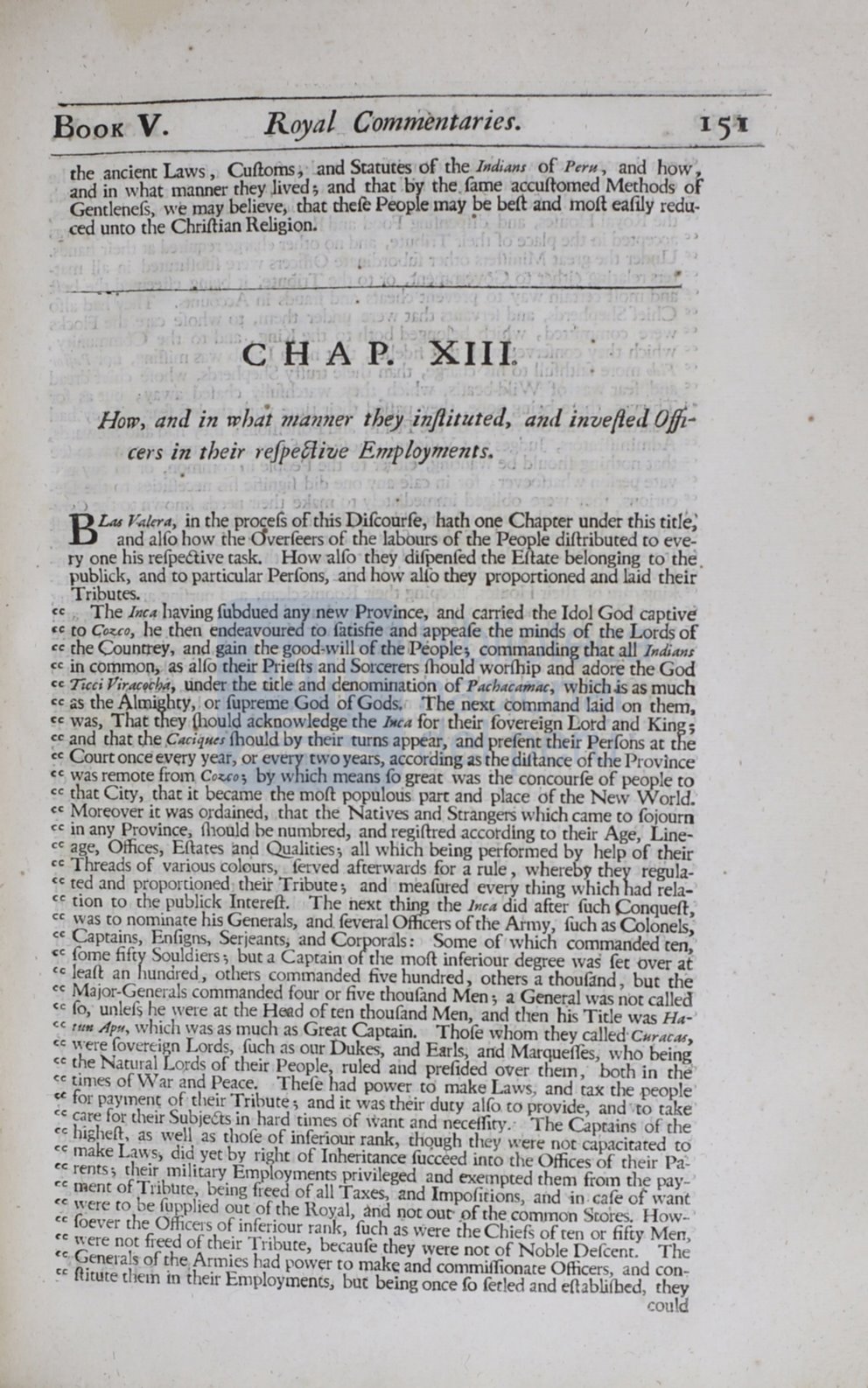

BooK
V.
J{oyal
Cvmmentaries.
h
·
t
Laws
Culloms
and Statutes
of
the
Indians
of
Pent,
and
how~
~d
rnc:hat
ma~er
rhey liv;d; and
that
oy
the.
fame
accuftomed Methods
ot
GentleneiS,
we may
believ~,.
that theie People
may
pe
bea
and moft
eafily
redu..
ced unto the Chriftian Religion.
1
•
J
•
How,
a~d
in what
11ianner
they inflituted, and invefied
Offi-
cers in their refPeblive Employments
~
·.
,,
t
B
.
>
Lu
T/.alera
in the proce1s
of
this Difconrfe, hath one Chapter under
this
tide;
and alf
~
how the
·dverfeers
of
the
labours of the People dillributed co eve–
ry one his refpective task. How 4lfo they difpenfed the
Efi~e belongin~
to
t~e
publick,
and
to particular
Perfons, and
how
alf
o they
proportioned
and la1d
their
Tributes.
.
,
.
cc ,
The
Inca
having
fubdued any new
Provmce, and
earned
the Idol
God capuve
cc
co
Couo
he then
endeavoured to fatisfie
and appeafe
the minds
of
the Lords
of
cc
the (:oi{nrrey, and gain the good-will of the .People; commanding that
all
Indjans
cc
in common, as alfo
their
Priefis
and Sorcerers
fhould
worihip and
adore
the
God
cc
T~ci
Pir,acocba,
under the title and
denomination of
Pachacamac,
which
.is
as
much
cc
as the
Almighcy,
or
fupreme God
of
Gods.
The
next
command
laid on them,
cc
was, That they {hould acknowledge the
/'Ilea
for their fovereign
Lotd and
King;
cc
and that r,he
C1teiques
fhould
by
their
turns
appear,
and
prefent
their
Perfons
at rhe
cc
Court once
every
year, or every two
years,
accoraing as the diilance ofthe Province
cc
was
remote
from
Couo;
by which
means
fo
great
was
the
concourfe of
people
to
cc
that
City,
that
it
became
the
moll: populous
part
and
place
of
the
New World.
cc
Moreover
it
was ordained, that the Natives and Strangers
which
came
to
fojourn
cc
in any Province,
fhould
he numbred, and regiftred
accotding to
their Age, Line–
cc
age, Offices, Efrates
and
Qg_alities; all
which
being performed
by
help of their
cc
Threads of various colours, ferved afterwards for a
rule,
whereby they regula–
cc
ted and
proportioned
their Tribute; and rneafured every thing which had rela–
cc
tion to
the publick Intereft. The next
thin_g
the
lnca
did
after fuch
Conqueft,
cc
was
to
nominate
his Generals, and. feveral Officers of the
Army,
fuch as Colonels,
cc
Captains, EnGgns,
Serjeanrs,
and
Corporals : Some of which
commanded
cen,
<C
forne
fifty
Souldiers; but a
Captain
of
the
moll: inferiour
degree
wa5
fee
-over
at
cc
leafl: an hundred,
others
commanded five hundred, others a thoufand, but the
cc
Major-Generals commanded
four
or
five
thoufand
Men;
a General was
not
called
cc
fo,
unlefs he were at the Hood of ten thoufand Men, and then hi Title was
Ra–
ce
rim
Apu,
which was as
much
as
Great
Captain. Thofe whom they called
CuracM,
cc
were
fovereign
Lords, fuch as our Dukes, and Earls, and Marquelfes, who being
cc
the Natural
Lords of
their
People,
ruled
and prefided
over them, both
in
rhe
cc
times
ofWar
and
£?eac~.
Thefe
h~d
power.
to
make Laws, and tax
the
people
~for paymen~ of-t~1err
Tnbute;
_and
it
was their
duty
alfo co provide,
and
to take
cc
c~re
for their
Sub1e& m
hard
tunes of
\Vant
and neceffiry.
The
Captains of the
cc
h1ghefi,
as we.11 as thofe. of inferiour
~ank,
thqugh
t~ey
were not capacitated to
cc
make
Laws,
did yet by nght of Inhentance fucceed mro the Offices of their
Pa–
:: rents;
thei~.
military.
E~loyments
privileged
and
exe~pted the~
from
the
pay–
ee
ment ofT11bUte,. bemg
freed of
all
Taxes, and lmpofitions,
and
m.cafe
of
want
were to
be
(uRplied out of the RoY,al,
and
not out' of the
common
tores.
How–
::
f~ever
the _Officers
o~ infe~iour
rank,
fuch
as
were
the
ChieB of ten or
fifty
Men,
.
"~ere
not
fieed of their Tribute, becaufe
they were not of
Noble Defcent. The
cc,
Generals of
the
Armies had
pow~r
to
mak~
and
commiffionare Officers
and
con-
.
~c
!Htute them in their Employments, but being once
fo
fetled and
efiablilbed,
they
rou
d














